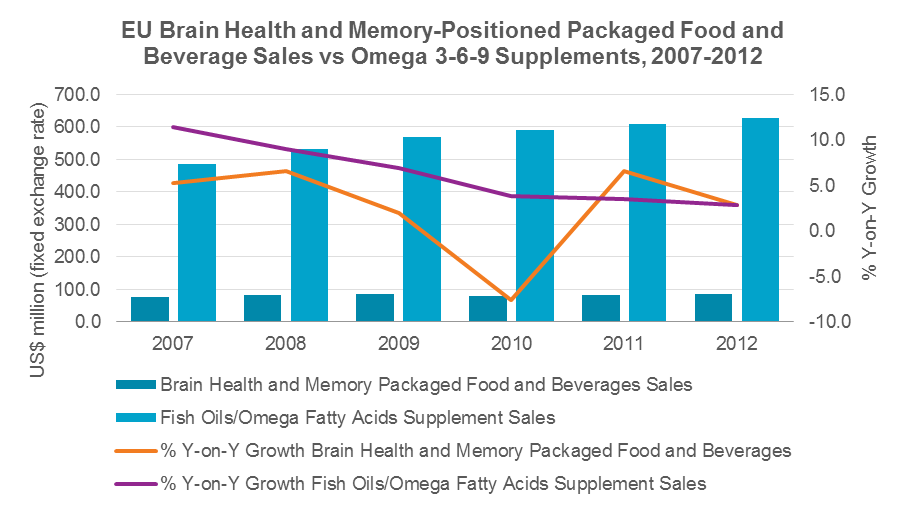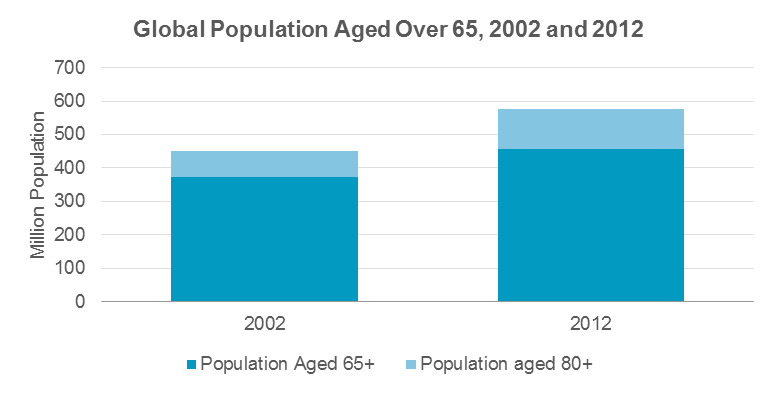Approved nutrients include biotin, omega-3 form DHA, folate, iodine, iron, magnesium, niacin, pantothenic acid, thiamine, vitamin B12, calcium, vitamin B6, vitamin C, water and zinc. However, many consumers remain somewhat uneducated about the brain health benefits of the majority of these ingredients.
Demand is primarily being driven by two forces: An ageing global consumer base and parental determination to optimise their children's potential. However sales are still to show any sign of reflecting the wide variety of claims as the EU is somewhat lagging behind other regions.
In the EU, retail value sales of foods and beverages – excluding milk formula – with a purely brain health and memory positioning remained fairly limited in 2012, standing at just US$86m, or 16% of the global total. In fact, globally, real growth was a mere US$34m over 2007-2012.

Omega-3 is king
Where innovation is taking place, omega-3, or more specifically docosahexaenoic acid (DHA), has taken centre stage. It is seen on nearly every baby milk formula. In these products, added nutrition offers scope to optimise children's brain development. Yet, the category targeting children’s mental development, excluding infant formula, in the EU is spreadable oils and fats, with Unilever’s Blue Band leading the way.
Other successful innovations include Birds Eye Foods Inc’s Fish Fingers with added omega-3, providing around 50% of the recommended daily intake (RDI), and fortified milk through brands such as Puleva, which saw sales reach US$134 million in 2012.
Nevertheless, it is the rapidly expanding base of middle-class consumers in emerging economies, with high aspirations for their children and a willingness to make sacrifices, which is the prime target audience for products containing ingredients which benefit developing brains and are looking beyond DHA.
Trust in efficacy essential in changing consumer habits
For adults omega-3 supplements are still the main vehicle for consumption, with sales of US$384m in 2012, nearly five times that of food and drink. The lack of transition from supplements to food and drink is down to consumers finding it difficult to recognise the tangible health benefits of the latter, preferring to trust a more pharmaceutical approach.
Germany, the largest market in the EU, saw sales of just US$59m in 2012, predominantly thanks to the Becel brand.
If manufacturers are able to get consumers to start to trust the efficacy of brain health ingredients and buy into the concept of prevention rather than treatment, there is the potential to target a wide range of brain-health related concerns, including depression.
The US government has funded a number of studies aimed at linking diet with depression, including a 2011 study which found that male US military personnel on active duty between 2002 and 2008 with the lowest levels of DHA had a 62% increased risk of suicide than their counterparts with higher levels. Another US-based study found eating fish during pregnancy could cut a woman’s odds of developing post-natal depression.
Omega-3 will continue to retain its lead due to its familiarity and strong research findings but other ingredients could soon be in the spotlight. For example, research from Oxford University which studied 250 people aged over 70, including those with mild cognitive impairment, found that vitamins B6, B12 and folic acid slowed mental decline. Both of these ingredients gained approved EU article 13.1 health claims for normal psychological function.
Target drinks and not just food
With a wide variety of B vitamins and even vitamin C gaining a claim for brain health, this opens up the possibility to target a wide range of food categories. Nuts and pulses, for example, are a good source of thiamine and bran is a source of niacin. But, in particular, it offers the opportunity to innovate within beverages. In 2012, in the EU, just Poland and Denmark have a market for brain health and memory-positioned beverages, for example Mokate from Grupa Firm Mokate in Poland.
Look to countries with a rapidly growing ageing population
While it is evident that even though the mature adult demographic is of great interest to companies, brain health concerns – memory loss, depression, loss of cognitive agility – are poorly catered for. Good nutrition can help to slow down this detrimental process, while some nutrients may even be able to stave off seriously debilitating conditions like Alzheimer's disease. The claim ‘normal cognitive function’ given to the ingredients iron, iodine and zinc, if used in products may well attract the older consumer concerned about mental health issues.

Brain health and memory-positioned foods and beverages are set to be driven predominantly by the Asia Pacific, but the gain could be considerably higher in the EU if manufacturers took full advantage of the benefits of functional ingredients and introduced products targeted at the older consumer. Countries with a high index of ageing, such as Germany and Italy, could be targeted as their populations, which are likely to have healthy diets, would be willing to incorporate products to enhance their mental capacity.
Diana Cowland will be presenting some of these issues at Vitafoods Europe on May 15.
